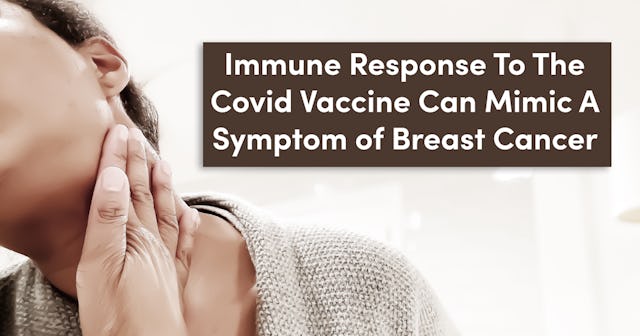Immune Response To The Covid Vaccine Can Mimic A Symptom of Breast Cancer

You get your COVID-19 vax and notice, days later, that there’s a swollen lump in your armpit area. Of course, you begin to panic, as you’re well-aware of the symptoms of breast cancer. However, before you go into a spiral of anxiety, you need to know that your immune response to the COVID vaccine may create unnecessary worry and perhaps be completely typical. Furthermore, you may make some slight adjustments to your yearly mammogram scheduling after being vaccinated, under a doctor’s advice.
According to The American Cancer Society, “swelling or tenderness of the lymph nodes under the arm” where you received the injection can occur. They explain that “this is often a normal response by the body’s immune system, which is getting ready to fight a future COVID-19 infection.” They go on to add that of course, a swollen lymph node can cause you to be worried, since yes, this can be a cancer symptom. They suggest that if you have “swollen or tender lymph nodes” that stay for a few weeks or increase in size, reach out to your doctor.
Symptoms of breast cancer can include a “new lump in the breast or underarm,” nipple changes or pain, bloody or other discharge, pain, changes in the breast’s size or shape, “redness or flaky skin” on the breast or nipple, breast skin dimpling or irritation, and “thickening or swelling.” Therefore, it’s not unreasonable that someone who notices a lump under their arm is concerned, even if this seems to coincide with receiving the vaccine.
The CDC shares common post-vaccine side effects which include swelling and pain in your arm, plus fever, chills, tiredness, and headache. They state that these are “normal signs that your body is building protection.” Adding, “These side effects may affect your ability to do daily activities, but they should go away in a few days.”
In another report, they shared that axillary swelling or tenderness was reported between 11% to 16% for those ages 18 to 65 between the two Moderna doses. This occurred more frequently among the under sixty-five crowd than the older population.
When should you call your doctor? The CDC notes that if you experience increased “redness or tenderness” where you got the shot after the first twenty-four hours, or your side effects aren’t going away after a few days (or you are feeling worried about the side effects), you should notify your doctor. Of course, signs of an allergic reaction to the vaccine warrant immediate emergency medical attention.
dmphoto/Getty
What if you have a mammogram scheduled close to the time you receive your vaccine? The American Cancer Society weighs in. First, “swollen lymph nodes under the arm might show up on a mammogram.” Therefore, if you get your vaccine and have a fairly soon mammogram appointment following, you need to “tell your doctor when and in which arm you received the injection.” The doctor can then decide if you should delay your mammogram appointment—or not. Don’t make this call on your own.
The problem with swollen lymph nodes from the vaccine and having a mammogram, in which the lymph nodes are detected, might cause undue concern and unnecessary appointments and tests. Informing your doctor of when—and in which arm—you had the vaccine is important. Again, it’s important that you don’t cancel or delay your mammogram without speaking with your doctor first.
After all, breast cancer impacts a lot of women. In fact, one in eight women will be diagnosed with invasive breast cancer. This year, we will expect to see over 281,000 new cases of invasive breast cancer and over 49,000 cases of in-situ (not invasive) breast cancer. And let’s not forget, men can also be diagnosed with breast cancer, though far fewer. It’s reported that a man’s risk of being diagnosed in their lifetime is approximately 1 in 833. 11% of breast cancer patients are women age forty-five or younger.
According to Harvard Medical School, there are many breast cancer risk factors including one’s family history, genetics, age, personal cancer history, and breast density. Other risk factors include radiation exposure, estrogen exposure, a history of atypical hyperplasia, weight, and alcohol consumption. White women are more at risk of developing breast cancer than Black women, but Black women are more at risk of death.
Early detection is very important. Three important things you can do starts with a monthly self-breast exam in which you feel and look at your breasts. Also, make sure to see your gynecologist annually, and ask for a breast exam. Finally, get your mammogram.
As always, if you have questions about your breast health or the COVID-19 vaccine (including any reactions), reach out to your medical provider. Please don’t go to online forums and make your own health care decisions based on anecdotal “evidence.” Breast cancer and COVID-19 (including any vaccine responses) can be serious. It’s important to be aware of your body, be your own advocate, and have an open line of communication with your doctor.
Information about COVID-19 is rapidly changing, and Scary Mommy is committed to providing the most recent data in our coverage. With news being updated so frequently, some of the information in this story may have changed after publication. For this reason, we are encouraging readers to use online resources from local public health departments, the Centers for Disease Control, and the World Health Organization to remain as informed as possible.
This article was originally published on